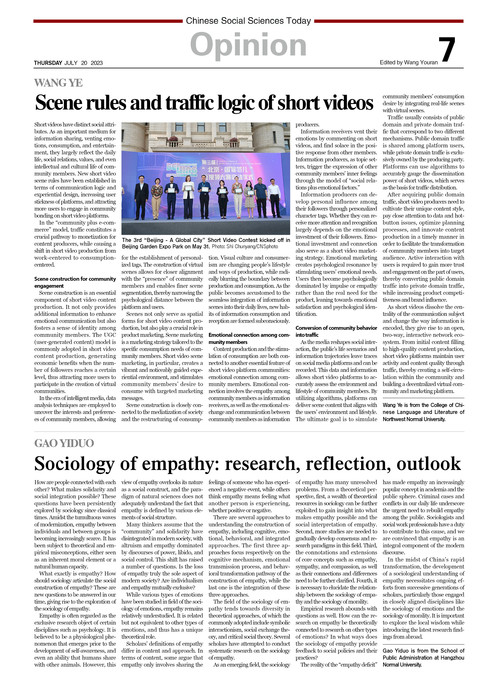Sociology of empathy: research, reflection, outlook
2023-07-20 17:33:03
How are people connected with each other? What makes solidarity and social integration possible? These questions have been persistently explored by sociology since classical times. Amidst the tumultuous waves of modernization, empathy between individuals and between groups is becoming increasingly scarce. It has been subject to theoretical and empirical misconceptions, either seen as an inherent moral element or a natural human capacity.
What exactly is empathy? How should sociology articulate the social construction of empathy? These are new questions to be answered in our time, giving rise to the exploration of the sociology of empathy.
Empathy is often regarded as the exclusive research object of certain disciplines such as psychology. It is believed to be a physiological phenomenon that emerges prior to the development of self-awareness, and even an ability that humans share with other animals. However, this view of empathy overlooks its nature as a social construct, and the paradigm of natural sciences does not adequately understand the fact that empathy is defined by various elements of social structure.
Many thinkers assume that the “community” and solidarity have disintegrated in modern society, with altruism and empathy dominated by discourses of power, libido, and social control. This shift has raised a number of questions. Is the loss of empathy truly the sole aspect of modern society? Are individualism and empathy mutually exclusive?
While various types of emotions have been studied in field of the sociology of emotions, empathy remains relatively understudied. It is related but not equivalent to other types of emotions, and thus has a unique theoretical role.
Scholars’ definitions of empathy differ in content and approach. In terms of content, some argue that empathy only involves sharing the feelings of someone who has experienced a negative event, while others think empathy means feeling what another person is experiencing, whether positive or negative.
There are several approaches to understanding the construction of empathy, including cognitive, emotional, behavioral, and integrated approaches. The first three approaches focus respectively on the cognitive mechanism, emotional transmission process, and behavioral transformation pathway of the construction of empathy, while the last one is the integration of these three approaches.
The field of the sociology of empathy tends towards diversity in theoretical approaches, of which the commonly adopted include symbolic interactionism, social exchange theory, and critical social theory. Several scholars have attempted to conduct systematic research on the sociology of empathy.
As an emerging field, the sociology of empathy has many unresolved problems. From a theoretical perspective, first, a wealth of theoretical resources in sociology can be further exploited to gain insight into what makes empathy possible and the social interpretation of empathy. Second, more studies are needed to gradually develop consensus and research paradigms in this field. Third, the connotations and extensions of core concepts such as empathy, sympathy, and compassion, as well as their connections and differences need to be further clarified. Fourth, it is necessary to elucidate the relationship between the sociology of empathy and the sociology of morality.
Empirical research abounds with questions as well. How can the research on empathy be theoretically connected to research on other types of emotions? In what ways does the sociology of empathy provide feedback to social policies and their practices?
The reality of the “empathy deficit” has made empathy an increasingly popular concept in academia and the public sphere. Criminal cases and conflicts in our daily life underscore the urgent need to rebuild empathy among the public. Sociologists and social work professionals have a duty to contribute to this cause, and we are convinced that empathy is an integral component of the modern discourse.
In the midst of China’s rapid transformation, the development of a sociological understanding of empathy necessitates ongoing efforts from successive generations of scholars, particularly those engaged in closely aligned disciplines like the sociology of emotions and the sociology of morality. It is important to explore the local wisdom while introducing the latest research findings from abroad.
Gao Yiduo is from the School of Public Administration at Hangzhou Normal University.


